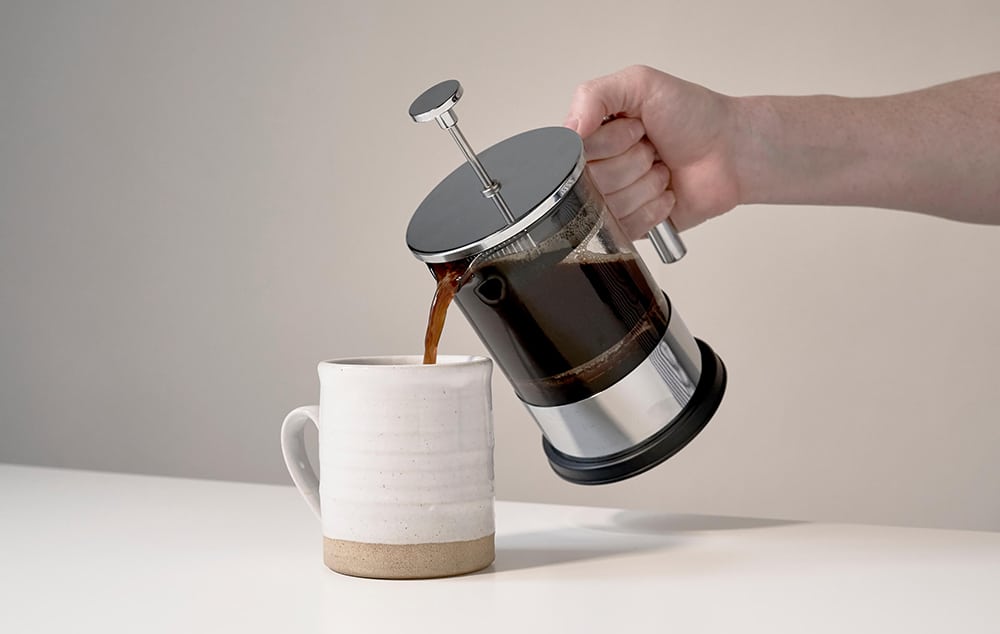

There are several things you need to make a decent cup of coffee. These include some delicious ground coffee or a bag of your favorite beans, a reasonably-priced coffee grinder, as well as a brewer to put it all together. Once it’s brewed, the obvious additions are cream and sugar, which help to reduce any bitterness to the coffee you’re drinking.
Of course, some experts think there is a better way to improve your chosen brew, which is by putting salt in coffee. This may sound strange until you realize all of the benefits salt has to offer in your brewed beverages. This spice has been around for years, serving a variety of purposes, including altering and enhancing the flavors of our food, so it shouldn’t be too much of a surprise that it can alter those unpleasant notes in our coffee. For more information on the benefits of salted coffee, read on.
There are a few reasons why even the best coarse ground coffee can taste bitter. Coffee beans contain chlorogenic acids lactones and phenylindanes, both of which are altered when the beans are roasted. These add bitterness to the coffee. Improper extraction can also have similar results.
If you add salt to coffee, this can help to activate the salt receptors in our tongues, which then increases the sweet, sour, and umami flavors in the coffee while blocking out those bitter undertones. As well as making your coffee taste better, it also reduces the need for sugar and cream, so you don’t need all those extra additives to enjoy a good cup of brew.
There are several benefits to coffee with salt, including health-related improvements as well as flavor enhancement. We’ll discuss each of these below.
There are a lot of health benefits Trusted Source All About Salt: Health Benefits, Risks, Types, How to Cut Back, and More | Everyday Health Many Americans get too much salt, but you need this mineral in your diet for proper thyroid function, to avoid low blood pressure, and to stay hydrated. But too much may harm your heart, bones, and stomach. Learn more about salt in this detailed guide. www.everydayhealth.com associated with salt, including proper thyroid function, low blood pressure, hydration, improved cystic fibrosis symptoms, increased adrenaline, and fat burning, just to name a few. Drinking coffee can also reduce sodium levels in your body, so adding some salt to your brew can reduce this loss, preventing this loss.
As we discussed above, adding salt to your coffee reduces bitterness by activating the taste buds related to salty flavors while inhibiting the ones that taste bitterness. There have even been studies Trusted Source Suppression of Bitterness by Sodium: Variation Among Bitter Taste Stimuli | Chemical Senses | Oxford Academic Abstract. Taste interactions between salts (NaCl, LiCl, KCl, L-arginine:L-aspartic acid, Na-acetate and Na-gluconate) and bittertasting compounds (urea, quinine academic.oup.com done to prove salt’s ability to suppress bitterness, so it’s no wonder it has such an amazing effect on your favorite brews, even if your extraction process needs a bit of work.
As we discussed above, salt opens up those taste buds that detect sweet flavors, which can help enhance the natural flavors of the coffee you’ve chosen. This brings out the richness of the coffee, so you taste more of those undertones that you may otherwise miss.
Water that has been sitting in your coffee maker’s tank can become stale, which alters the flavor of your coffee. Adding a bit of salt can help improve the quality of this water and prevent it from ruining a good brew. Salt also increases water density for a thicker coffee texture, which many people prefer.
Adding sugar is common to reduce the bitterness coffee is known for and to give it a bit of sweetness. The downside is that sugar isn’t the healthiest option, especially for those with health issues that require limited sugar intake. Salt is a fine replacement, giving your coffee the boost it needs.
We’ve discussed why to put salt in coffee and how it enhances the flavor but there are a few downsides to this additive you may want to consider before trying it out.
As well as salt in coffee health benefits, there are also some health issues to using this spice. Those who are sensitive to sodium should avoid using it in their coffee. Too much salt can also raise the sodium levels in your body. This can cause inflammation in your stomach lining or some heart-related problems.
A bit of salt in your coffee can enhance the flavor but too much of it can negatively change the taste, making your brew undrinkable. That’s why it is important to add a specific amount of salt to your coffee, whether you’re using it in your grounds or adding it to your mug after you’ve poured yourself a cup.
Adding salt to coffee is becoming more common but there are a few questions people ask before they test it out. The following are the ones most frequently asked.
There are a couple of ways to add salt to coffee. One method is to add it after the coffee has already been brewed and you’ve poured it into your favorite mug. This way, you can taste the coffee before any additions are added. If it needs some enhancement, you can place a pinch of salt in the coffee, adding a bit more as needed until it is perfect. You can also add it to the grounds, which we’ll discuss more below.
Yes, you can put salt in coffee grounds rather than into the brewed cup. Alton Brown, food science expert and the author of several cookbooks, recommends adding a quarter of a teaspoon of kosher salt to every 6 tablespoons of grounds to enhance the flavor. This isn’t enough to give the brew a salty taste but still accentuates the natural coffee flavor and reduces bitterness. Of course, you can adjust this to taste as needed.
How much salt to add to coffee depends on when you add it and how much coffee you’re brewing. If you’re adding it to a brewed cup of coffee, a pinch of salt is likely enough, give or take a few grains. If you’re brewing a pot, how much salt you use depends on the amount of grounds you’re using.
The Chemex Classic Series includes varying glass coffeemaker sizes to brew different amounts, so if you’re using a larger carafe for more coffee, you’ll need to add more salt to match the higher amount of grounds. Smaller brewing levels need less salt. It may be a good idea to experiment with the brewer you have on hand or you can follow the instructions from Alton Brown that we mentioned above.
There is no rule on which type of salt should be used with coffee. Some people stick with simple fine ground salt, while others go for the fancier kosher salt or Himalayan salt. There are also some specialty salts available, like the Espresso Sea Salt, which contains a mix of natural sea salt and coffee. This can be used to enhance your coffee’s flavors in various ways, plus you can use it in baked goods, on meats, and in many other ways in the kitchen.
Sugar, milk, and flavored creamers are common additions to your favorite cup of coffee but another addition may render these extras obsolete. Adding salt to coffee isn’t entirely new but it has gained popularity among coffee connoisseurs, giving their brews a boost of flavor while eliminating the bitterness from roasted beans and overextraction.
Putting salt in coffee does more than just reduce the coffee’s bitterness. It also helps improve the flavor of stale water, reduces the amount of sugar needed, and even has a variety of health benefits. You can use any type of salt you want, adding it before and after brewing, giving you the ability to enhance your coffee any way you like with this simple alteration to your recipe.





